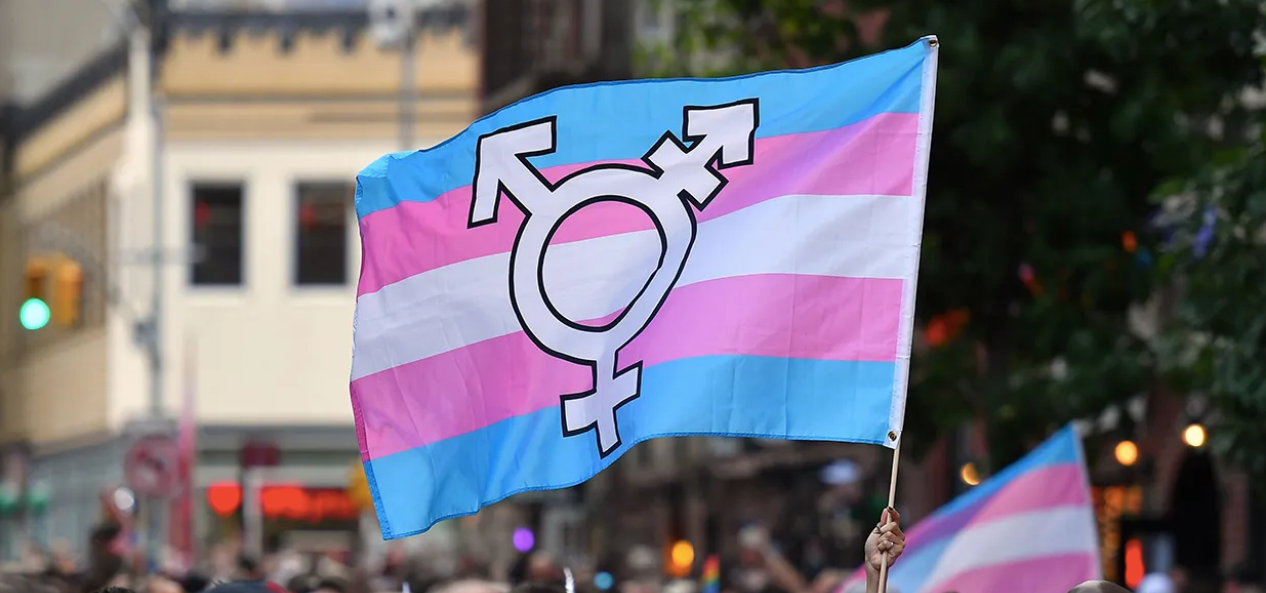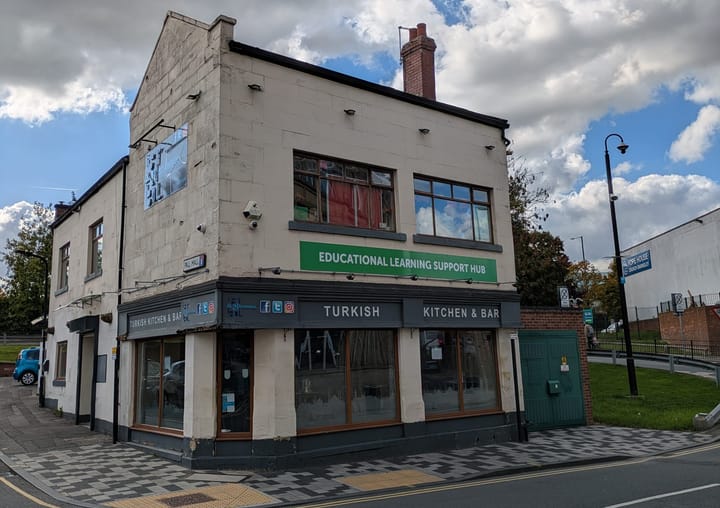Authors Ambrose McMonagle and Cassandra Lovelock reflect on the growing fervour of anti-trans rhetoric and the on-going failures of the political establishments through lived experiences, both personal and professional.
By Ambrose McMonagle (they/them) and Cassandra (Cas) Lovelock (she/they)
Content warnings: Self-harm, Suicide, Transphobia, Vomit
Prior to meeting in academia, we both worked in politics, and have found refuge in each other’s experiences navigating the insidious growth of transphobia in our former workplaces. It has, like the purported mould on a certain writer’s walls, only continued to grow in toxicity, seeping deeper into the walls and minds of governing institutions across the UK.
We have both grown weary of the whack-a-mole method that has come to define policy approaches to the transgender community, particularly in the repeated surprise of politicians every time a new mole emerges. That is to say, we have grown tired of the failure of the political establishment to understand, or take seriously, that transphobic radical exclusive feminists (TERFs) are an organised movement who will continue to appear and demand more satisfaction to fill their ever-deepening cups. Accountability for the speed at which TERFs went from background noise to political heavyweights lies at the doors of Whitehall and Holyrood.
With the recent UK Supreme Court ruling ‘For Women Scotland Ltd v The Scottish Ministers,’ we have felt that it was important to respond, based on our own personal and professional experiences. We knew we wanted to be reflective of our experience navigating the ‘transgender debate’ as professionals involved with LGBTQ+ policy and research, but also as people whose various intersections of identity have historically (and presently) been subjected to the violence of the biological fundamentalism that pushes the transphobic tidal wave we are living through. Our key concern lies with respect to the enforcement of this judgement, and the co-opting of the medical-industrial complex as its enforcers.
Toilets, a historically contested battleground for access, have proven to be one of the first areas the Equality and Human Rights Commission (EHRC) have targeted for enforcement. As a wheelchair user (Cas, hello), and as a cane user (Ambrose, hello), we are intimately familiar with how the medical-industrial complex can be used as a means of control, but more than that, we are hyper-aware of how discriminatory not having access to a bathroom can be.
I (Cas) live with, among many things, Gastroparesis – a paralysed stomach. I struggle with digesting food and when it can’t go into your digestive track, it comes back out your mouth. I need access to a safe secure bathroom to throw up. It’s grim but it’s the reality. I need access to a clean bathroom to inject medication, lest I get my stomach out in the middle of the office. I’ve been trapped on trains with broken accessible bathrooms and pissed myself. I (Ambrose) have various conditions: handily summarised by an NHS medical trial recruitment letter as situating me in the ‘extreme chronic pain cohort’. I need access to a bathroom where I can receive support should I have a flare, but in order to access this space at my office, I have to first choose a gendered bathroom to go into, where the disabled cubicle is tacked on in a booth at the end.
Bathroom access and bathroom discrimination continues to have long-term impacts for everyone today, not just disabled people; with access to functioning (ideally clean) public bathrooms essential for our (as individuals, and as disabled people) ability to move through the world.
If you left the house and discovered there was no longer any toilet you could use anywhere except for the one in your home, would that change things for you? What if your disability meant you were incontinent, would you be happy to leave knowing you’d likely piss yourself at some point because there was nowhere to go?
As the ‘loo leash’ gets shorter and shorter we are less inclined to leave the safety of our home, slowly erasing the presence of the disabled people society once again. Starting with bathrooms, policing trans people's access to public spaces is just going to force more of us into hiding (anyone remember the Ugly Laws?)
We also know from the Cass Review (which preceded this case) that the Government is willing to turn to the medical establishment as a means of control. We know from leaked NHS Guidance that this poses a risk to people of all ages. And we know from trying to work within the system that it will continue to fail every transgender child and transgender adult as acceptable sacrifices on the altar of ‘progress.’ How much longer can we consider the political establishment’s engagement with the trans community as being in any sense of good faith? And what can we do about it?
For Women Scotland Ltd v The Scottish Ministers: The problem with definition
The UK Supreme Court’s intervention (For Women Scotland Ltd v The Scottish Ministers UKSC/2024/0042) has had its praises sung as a victory for common sense. However, we have both come to consider this refrain as a red flag of fascism; let’s break down why that is.
This court case is concerned with statutory interpretation of the Equality Act 2010 (EA 2010), in focus are specific words: ‘women’ and ‘sex’. The court in this case is concerned with the intended meaning of these words in the EA 2010. Does the term ‘women’ in the EA 2010 include transgender women with a gender recognition certificate, and can they benefit from the protections the EA 2010 provides to women? Such protections include: being able to claim discrimination, and access to single-sex spaces.
In a unanimous verdict, the court agreed that, in the EA 2010, the words ‘women’, ‘man’ and ‘sex’ all referred to their biological status. Women = biological women, men = biological men, and sex = biological sex. Furthermore, they concluded, sex is binary. As such, the law has deemed that transwomen are not women, transmen are not men, and that nonbinary people like me (Ambrose) do not exist. (For more in-depth discussion of the legal implications of this, I would recommend the coverage of Oscar Davies, and Jess O’Thomson.)
For a case all about definitions, the Supreme Court pulls up short, declining to define what they mean by biological sex:
Although the word ‘biological’ does not appear in this definition, the ordinary meaning of those plain and unambiguous words corresponds with the biological characteristics that make an individual a man or a woman. These are assumed to be self-explanatory and to require no further explanation. [Paragraph 171 of the Judgement]
The courts relying on biology as a self-explanatory, self-evident truth should be concerning for everyone; the enshrining of the so-called binary truth of sex in law establishes a dangerous precedent. Historically, there have been repeated attempts to rely on an unshakeable, observable biological fundamentalism as it relates to race, disability, sexuality, and each of these have come to be disproven in equal measure. A legally enshrined binary of sex presents a new harm to the trans community, but one would be remiss not to acknowledge the historic legacy of harm it has caused the intersex community.
This case cuts to the heart (if they can be said to have one) of campaigning by transphobic groups: that of biological fundamentalism. Using ‘just facts’, ‘common sense’ or ‘biological truth’ as shields, they are enabling reductionist interpretations of sex that increasingly close the box around what a woman actually is. It is notable the degree to which women are discussed in relation to their reproductive capacity in this case, which would indicate the next area of attack that this movement will target in their definitional pursuit of womanhood.
We Can Always Tell: The problem with enforcement
Claiming that sex is self-evident is one thing, trying to enforce it in practice is another.
A common refrain that TERFs fall back on is ‘we can always tell’, but the criteria utilised for ‘telling’ has become increasingly evident for its practically phrenological foundations; relying on racial and gender stereotyping, seeping with pseudoscience upon which the aforementioned mould is feeding.
Working on gender recognition reform in Scotland meant I (Ambrose) had my fair share of unpleasant encounters with TERFs, both inside and outside my place of work. A constant background hum at the beginning slowly and then all too rapidly rose into a crescendo of intimidation and spectacle. It was a period marked by memorable stunts in the form of faux fanny flashing the parliamentary chamber upon passage of the Bill. But this noise would come to fade into a distinctly banal kind of hatred characterised by bureaucracy, feigned concern, and a constant grinding down of any meaningful support for the community.
It was brutal to work amongst the parroting of transphobic slurs, pandering to hate groups, and parading of transphobic colours and memorabilia. Each day I would wake up and go to work and try to justify my right to exist in the face of a group who had come to the decision it was no longer politically viable to support us. No matter how obviously I stamped my pronouns, in email signatures, on pin badges, on posters on my desk, the TERF propaganda collage on the office window beside my own was always going to be granted more space to be heard. Being the token trans colleague took its toll, eventually leading to a suicidal breakdown.
From all that sound and fury arose a sudden suffocating silence.
During this period, there was one incident which has stuck with me most of all, perhaps in part for the rare humour it offered. In response to a self-portrait I had posted on social media, I was met with a comment: ‘You’ll never be a woman.’ Which, I remember thinking: yeah that’s my goal actually. My friends shortly responded with a Bloodborne-style meme: ‘transphobia failed’.

It is important to note, this failed application of logic, the ‘we can always tell’ falling apart so easily, was humorous to me in its absurdity. However, the logic itself is dangerous, having been weaponised violently against Black women, and particularly butch Black women. We need only remember the frenzy around Imane Khelif: even producing birth certificates will not dispel the fervour of TERFS.
As it turns out, whether it’s with me or Olympic Sportswomen, they can’t ‘always tell’, but the recent verdict only seeks to enforce the idea that ‘they’ can.
The law enshrining a fundamentally flawed, inaccurate and discriminatory understanding of sex advocated by this movement will only legitimate the state in taking measures to enforce it.
When we think about the how and the who, we need to consider the spaces where this enforcement will occur. As previously discussed, bathrooms are the immediate answer that springs to mind given the media frenzy and EHRC guidance. But also – on public transport, in educational settings like classrooms, sports environments, and statutory mental health services. This latter area – mental health – has formed a key part of anti-trans discourse, most notably through the publication of the Cass Review. On the last day of my job, the Scottish Government accepted the recommendations of the Cass Review, let’s dig into why that’s a bad idea.
‘A, B, Abolish the GIC’: Psychiatry, Cass, and the precedent it sets for policy regarding the trans community
Psychiatric knowledge is socially contingent – constantly shifting and shaped by the world it exists within – they don’t create new copies of the Diagnostic and Statistical Manual of Mental Disorders (DSM) for nothing. What ‘counts’ as mental illness is determined by what deviates from the ‘norm’, with certain ways of moving and existing in our social world pathologised by psychiatrists. For instance, homosexuality was classified as mental illness in the DSM from its first iteration and remained until activists succeeded in securing its declassification in 1973.
The part psychiatry and statutory mental health services will play in the future for the trans community should not be underestimated. As the government seeks to further equip psychiatry with the authority to decide whose distress and experiences are genuine and whose is imaginary or ‘mental illness’, trans and non-binary people appear to be first in line to have our experiences diminished and pathologised to appease a wider political and policy making agenda.
The Cass Review (2024) was commissioned by NHS England and provides a review of evidence with recommendations regarding gender identity services for children and young people. On publication, the Cass Review’s findings and recommendations were welcomed by the majority of UK media outlets, NHS England, the Editor-in-Chief of medical journal the BMJ, conversion therapy proponents such as the so-called Society for Evidence-based Gender Medicine, Sex Matters and Transgender Trend, as well as spokespeople for the Conservative and Labour parties, who promised to ensure it will be ‘fully implemented’.
In reality, the Cass Review included substandard and inconsistent use of evidence, non-evidenced claims, unethical recommendations, overt prejudice, pathologisation and the intentional exclusion of service users and trans healthcare experts from the review process. Importantly, the Cass Review's focus on children and young people is deliberate, stemming from the ‘we must protect children’ mentality that has been adopted by TERFs – we'll talk more about this later.
‘Hey, Streeting, Leave Those Kids Alone’
The Cass Review, to us, is a prime example of what we are arguing: how biological fundamentalism is the mould infesting our policy making spheres. The Cass Review was commissioned instead of focusing on the issues that Children and Young Peoples (CYP) mental health services face – historical under-funding, an inability to effectively link statutory mental health services with social systems like education and safeguarding, the lack of combined lived experience and evidence-based interventions, to name but a few. That is not to say that gender identity services were not in need of reform, quite the opposite given that 75% of people waiting for a first outpatient appointment at a gender identity clinic across Scotland had been waiting for up to 3 years in 2024. The remaining 25% had been waiting for more than 3 years.
With the ‘well-established' principles that underpin the Cass Review, it would seem that psychiatry and its diagnostic frameworks are being used as a means to delegitimise the lived experience of trans and non-binary young people. To doubt people’s experiences and label them as depressed, having PTSD or neurodivergent merely reflects and illustrates how young people being referred for care due to mental distress and/or trauma are being pathologised by a system that is denying their existence.
The Cass Review claims in point 5.30 (p.91) that:
[i]n Finland (Kaltiala-Heino et al., 2015; Karvonen et al., 2022) more than three-quarters of the referred adolescent population needed specialist child and adolescent psychiatric support due to problems other than gender dysphoria, many of which were severe, predated and were not considered to be secondary to the gender dysphoria.
In point 7.28, the Review states that ‘[t]he increase in presentations to gender clinics has to some degree paralleled this deterioration in child and adolescent mental health’, based solely on the fact that both have gone up in recent years. This shows an either deliberately avoidant or shockingly naive understanding of why an increase in mental health service use as occurred.
But let me (Cas) tell you, all of the following have led to a mental health crisis for young people: increased poverty, lack of attainment, a broken social contract leading to a pervasive sense of hopelessness and helplessness, the ongoing COVID-19 pandemic, the lack of social media management and safe ways to move through the digital world, climate change, government corruption, watching a genocide happening with so little power to create change, the lack of preventative mental health support before crisis leaving children and young people to struggle until breaking point, cuts to all the third spaces people used to be able to access, cuts to in-school support and educational plans to help the classroom feel bearable... I could go on and on.
The strategy of hiding gender-affirming care for trans children behind a maze of barriers is particularly notable in the second recommendation of the Cass Review which argues for ‘screening for neurodevelopmental conditions, including autism spectrum disorder’ when a young person is referred to NHS gender services. The Catch-22 faced by trans youth becomes apparent immediately: will this screening be conducted with their consent? If a child is found to be neurodiverse, will this then prevent them from accessing further gender affirming care? If a child refuses to undergo this screening, will they be denied care? And that is without even considering the wait times to be assessed for any neurodivergent condition. It is evident through this that the Cass Review is weaponising neurodivergence as a means to reduce the numbers of trans children, by stopping and moving them elsewhere in a manner where they cannot access gender-affirming care. The Cass Review is giving psychiatry the power to decide whose reality is real.
Notably, the Cass Reviews’ advocacy for neurodivergent children seems concerned with their gender presentation alone, with little attention towards major issues facing the neurodiverse community of police violence, restraints in education and continued institutionalisation. It similarly echoes the silence of many ‘gender-critical’ women on major issues facing women such as the growing anti-choice rhetoric and attempts to rollback abortion rights, the ‘epidemic of violence against women and girls’ and the rise of misogyny and the manosphere.
Disability has historically been weaponised as a means through which to deny capacity and consent of people– to be gay was to be mentally ill, to be a different woman from the norm was to be hysterical, to be anything but white was to have a lower IQ.
By conceptualising health via biological fundamentalism we, historically and now, are continuing to determine that an individual's value (whether capitalist or otherwise), belonging in our culture and desirability are all determined by things out of our control. More than that, we are equipping those in power to decide who is valuable enough to invest in and who should be hidden.
‘Make Fascists Afraid Again’: It was never about kids, it was always about control
Our conclusion is hardly a new one, as our work is built on the legacies of communities who have suffered and continue to suffer at the hands of medical technologies enacting state-sponsored violence.
Despite claims of wanting to ‘protect the children’, we know this has only ever been the starting point for outright discrimination against trans and non-binary communities. People with far more knowledge and experience than us have repeatedly stated that if any of this was about protecting children, then the focus would not be on trans folk. It would be on social issues which have long-term impacts on children’s development, attainment and, most importantly, happiness. It would be on changing poverty rates, investing in education, and a functioning health service. It would be in creating safe third spaces where kids can exist, and online spaces where children can explore who they are and who they want to be, supported by adults who are more concerned with compassion than a civil service pension.
If any of this was about protecting kids then kids would be feeling the impact: a positive impact. But the only kids feeling the impact of the direction of transphobia in the UK are the trans children forced to hide who they are. Transgender children are dying. They are dying by the hand of existential violence the state has extended to them. It is a state that refuses to acknowledge them in their life, or their death.
Trans kids deserve better.
Having lived with severe mental illness and neurodivergence, I (Cas) am intimately familiar with the interplay of self-harm/injury and suicide when the state is deciding your capacity and consent. As the system equips various state authorities – whether police, social care, or mental health services, to name a few – to ‘enforce’ sex binaries, we will see how the pathologisation of people’s lived experiences will occur to push past our rights. We have seen it happen to our peers, to myself, in mental health services where I am too insane, I’m hurting myself, I’m not responding to care, I’m not in my right mind, so those in power can do whatever they want to me under the guise of care. It’s starting with bathrooms, but like mental health ‘care’ it will end with stripping people of their bodily autonomy, their rights, and disregarding their consent to any process under the guise of protection. Whether it is protecting kids or protecting trans people ‘from themselves.’
All of this, and more than we could write ourselves, is why the centring of abolitionist logics at the most recent protests, combined with the emphasis on community care – with a focus on community-sourced ‘food, housing, medicine and trans joy’ – is so important. Transphobia has become a comfortable position for politicians to advocate, even though we know it is not a popular one with the electorate. But we cannot wait for this to translate into electoral results in Holyrood next year, or in Westminster come 2028/29.
We have both worked within the systems of power to try and facilitate change, and we both undergird our academic work with activist commitments; but it has been in the community we have fought to form, and keep alive, that we have found the most meaning. We can’t tell you that finding community will make everything better, but the issues we are standing against right now are issues which are fundamentally intertwined with struggles across a wide range of communities. The biological fundamentalism that has come to define this era of politics on TERF Island is a force that has been weaponised in the name of racism, disablism, and (perhaps a bit ironically, given who is arguing for it now), sexism alike. If you don’t know what to do about it now, look to those communities who have survived through it before. Know you are not alone.
We would like to thank Resisting Transphobia in Edinburgh and Cabaret Against Hate Speech for organising protests in Edinburgh and Glasgow on April 19th in solidarity against the Supreme Court Judgement. These protests, and some chants, have formed the title and headings throughout this article, as well as providing inspiration for its direction. We would also like to thank Edinburgh Mask Bloc for their continued provision of high filtration masks at protests, making them safe and accessible.
We would also like to thank Trans Kids Deserve Better: you do deserve better, and we will keep fighting to ensure you get this.
Ambrose McMonagle (they/them) is an activist and PhD student. They are in their first year of a PhD at the University of Glasgow focused on the institutionalisation of disabled people in Scotland, and the ways in which archives address legacies of institutional violence. Prior to this they worked as a Policy and Research Officer in the Scottish Parliament, which included work on Gender Recognition Reform. As an activist their work is driven by community care, supporting people in navigating neurodiversity and gender exploration alike.
Cassandra (Cas) Lovelock (she/they) is a scholar-activist at the University of Glasgow where they are a Lecturer in Research Methods and Inequality. As an activist she focuses on ethical ways of co-producing knowledge and knowledge equity among communities that are disempowered within mental health, social care, and welfare services in the UK. Their academic work focuses on qualitative investigations of the intersections of poverty, mental illness, and 'care' including unpaid care, state care, and wider definitions of 'caring'.






Comments ()